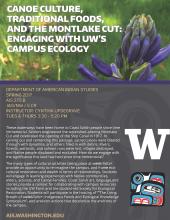Canoe Culture, Traditional Foods, and the Montlake Cut: Engaging with UW's Campus Ecology
AIS 275 B
Cynthia Updegrave
I&S - NW available by emailing elissaw@uw.edu
5 credits
TuTh 3:30 - 5:20
These waterways have been home to Coast Salish people since time immemorial. Settlers engineered the watershed-altering Montlake Cut and celebrated the opening of the Ship Canal in 1917. In carving out and cementing this passage, sacred places were blasted through with dynamite, and others filled in with debris. Rivers, forests, wetlands, and salmon runs were lost, villages destroyed, and Native people displaced and excluded. How do we engage with the significance this land has held since time immemorial?
The many types of cultural activities taking place at wǝɫǝbʔaltxʷ provide an opportunity to re-imagine the campus, and frame ecocultural restoration and wealth in terms of relationships. Students will engage in learning experiences with Native communities, elders, activists, and Canoe Families. Coast Salish art, language,and stories provide a context for collaborating with campus resources including the UW Farm and the student-led Society for Ecological Restoration. Students will participate in the hosting of “”The Living Breath of wǝɫǝbʔaltxʷ: Indigenous Foods and Ecological Knowledge Symposium”, and envision actions that decolonize the environs of the campus.
